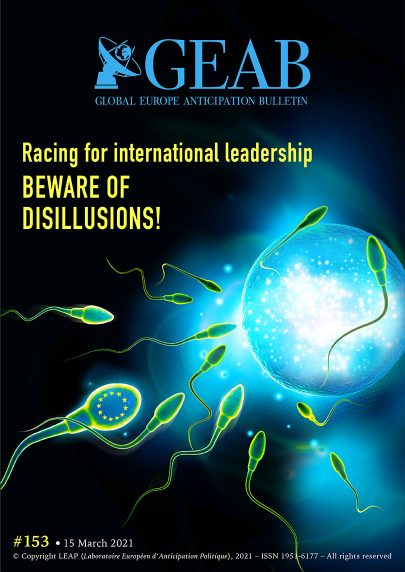GEAB 153

The ideological revolution of the European Union (EU) imposes a corresponding structural revolution.
2020 has accelerated all the trends of systemic transformation. But in 2021, this free flight into the interstellar void of our locked down planet will experience the turbulence of its entry into the atmosphere of the ‘world-after’.
For the last 20 years, Westerners in general, and the Europeans in particular, have dreamed of freeing themselves from earthly matters: degrowth, depollution, depopulation, etc. The new technologies have come to support these ideologies with their promises of ‘full dematerialisation’. The pandemic has made it possible to take a major step towards this virtualisation.
It has also allowed the EU to show its relevance, activating principles of solidarity, putting in place financial tools to the height of the continental stakes, and even giving itself vision and spirit, as shown in our article on the ideological revolution of the European institutions further on. In the calm of the pandemic, the EU has materialised a real vision, composed of ecological and digital transitions, resilience and strategic sovereignty, contributing to what some institutionals call an “ideological revolution”, accompanied by financial tools and major recovery plans to ensure its implementation.
But the world is a dangerous place. In 2021, Sleeping Beauty (Europe) wakes up to find a different world from the one she dreamed of while she was sleeping, strongly questioning the model of common governance that seemed to be consolidating last year. Thus, we believe that the European “ideological revolution” will not pass the reality check without an equivalent structural reform (you don’t break the sound barrier with a passenger plane – no matter how much super-kerosene it might have).
Waking up to an ultra-competitive world
First of all, we need to take stock of a key marker of the effectiveness of the European management of the pandemic, namely the vaccination campaign. Clearly a failure,[1] at least from the point of view of the harsh reality of an ultra-competitive multipolar world. In our “camp”, the British, the Americans and the Israelis – to mention only the most obvious ones – produced/attracted the vaccines they needed to the detriment of the EU. Indeed, the EU played a responsible and supportive card[2] – oh so justified! [3] – but lost in the face of the bloody competitions that are played out within a West whose members are all obsessed with winning/keeping/regaining their world leadership at all cost.
From a strategic point of view, we can deduce from this experience that:
. The law of the jungle reigns in an ‘allied’ camp where every man for himself and low blows are the norm;
. In the competition between ‘allies’ that emerges each time the opportunity arises[4] instead of the expected cooperation, the complexity and morality of the EU entity make it a slow player that loses every time;
. if the EU is too slow compared to its competition, it is too fast from the point of view of systemic realities (let us repeat that any hasty post-pandemic restart promises disasters, as the inflation and interest rate prospects already suggest) and from the point of view of its structure (the EU is in fact moving too fast for the reaction times that its size imposes on its maneuvers, as the recent monetary decisions of the ECB prove[5]).
These remarks help us understand that the EU will have to choose between two models:
. On the one hand, a “liberal” model made up of small, fast-moving players in competition with one another, evolving according to the needs of the moment along ad hoc alliances, compelling the EU to leave European states free to pursue strategies that best serve their individual interests. This world will be characterised by the law of the strongest, low blows, trade wars, all-out hacking, etc., with regard to the rest of the planet and between European countries, giving rise in the short to medium term to potential intra-European wars (whatever we might think of such options and whatever their form might be)
. On the other hand, organised governance based on cooperation, win-win logics, mastery of time … which is justified from the point of view of peace and world balance but which will, in the race for numbers, invariably put the EU behind players with simple governments such as the UK, the US or China.
… Unless it manages to merge the two models (agility and global coherence) which can only be done by opting for the second model to begin with.
Aiming ever higher
This paradoxical injunction gives rise to an essential idea: the principles of the European model (peace based on supra-national governance) now only make sense within the framework of an organised global governance that has yet to be invented. From this, here is an anticipation: if the EU is not in a position to contribute decisively and in the short term to the emergence of new transparent, effective and democratic global governance mechanisms (TED)[6] integrating the systemic characteristics of the 21st century, it will have ceased to exist in 2030. Or even before that, because its members will, one after the other, in one way or another, regain their ‘independence’: some disregarding the principles of the rule of law (Poland, Hungary[7]), others rejecting Europe without borders (Eastern countries…) or opposing the notion of strategic autonomy (Sweden[8]), etc.
The holding of the next G20 meeting this year in Italy under Mario Draghi’s mandate[9] provides an opportunity to announce something really interesting in this regard. We see in our article on the EU’s ideological revolution that European ambitions are strong. But the risk is that this next G20 meeting will be just another visionless and uninspired meeting, dedicated to accounting issues that will make citizens yawn with frustration.
We have already said that it is around the Eastern Mediterranean, between Europe, the Balkans, the Middle East and Africa, by bringing together States, Unions, populations and even religions (to assure compatibility), and by inviting the United States, Russia and China as observers, that the EU could start to contribute to the invention of the organisation of the 21st century.
Having to hear your children complain
The failure of the vaccination campaign will leave its mark, discrediting the EU and failing to encourage member states to comply with ideological (in the sense of being “out of touch with reality”) European watchwords. For instance, as regards the injunction to keep borders open within the common market, if the Eastern European countries had difficulty respecting this rule during the migrant crisis, it is now the heart of the EU that challenges it, starting with Germany itself.[10] But the vaccination campaign is not the only issue on which criticism will flourish, and the EU is about to start suffering the fate of those who act:
Login

Integration of an open foresight approach into the decision-making process, willingness to involve citizens to it, visionary and ambitious strategies... what’s happening to the European Commission?!! Our junior team immersed [...]
Whether or not one believes in the prophecy of Saint Malachi, who identified Pope Francis II as Peter the Roman (the last of a line of 112 popes) one thing [...]
After years of depressed prices as a result of short selling and the distraction of cryptocurrencies, the silver price is currently showing improved strength – even while it continues to [...]
A short guide for investors in times of reflation/inflation In the current context of extreme uncertainty, we have put together a series of 8 recommendations and practical tips to get [...]

Comments